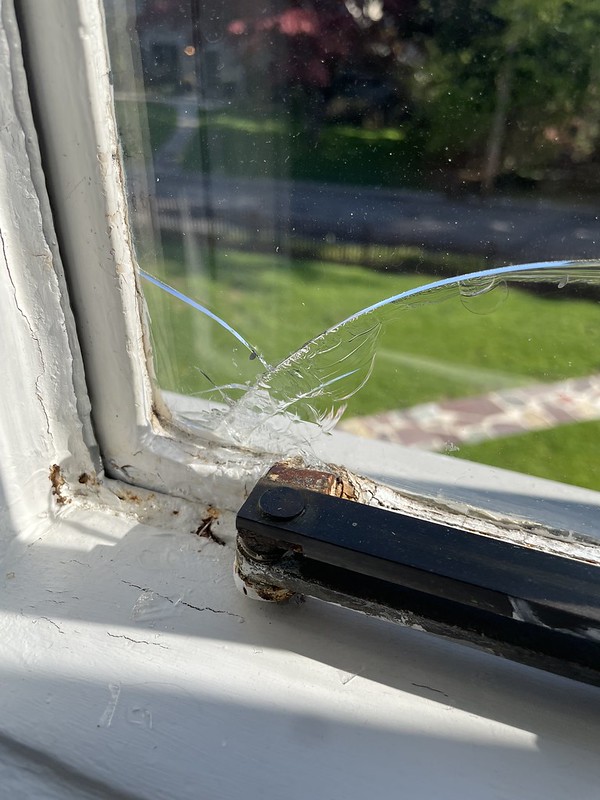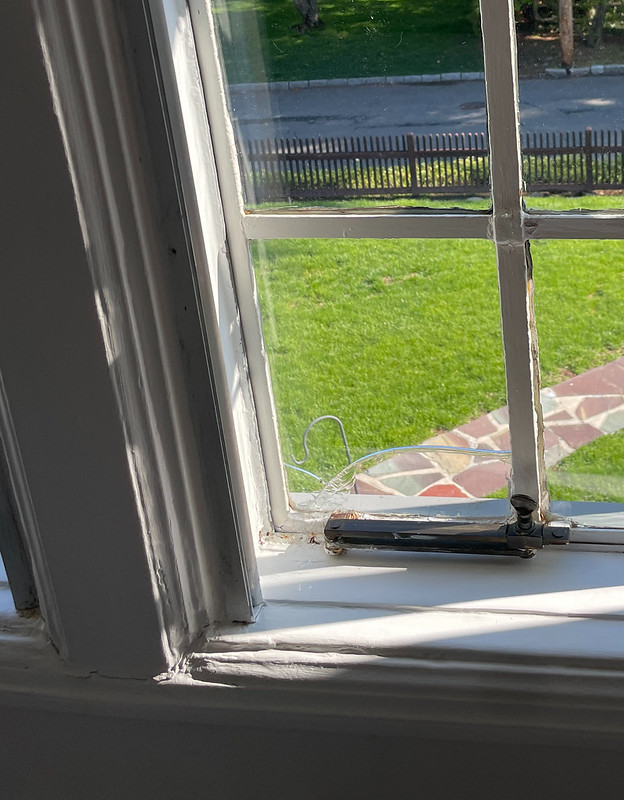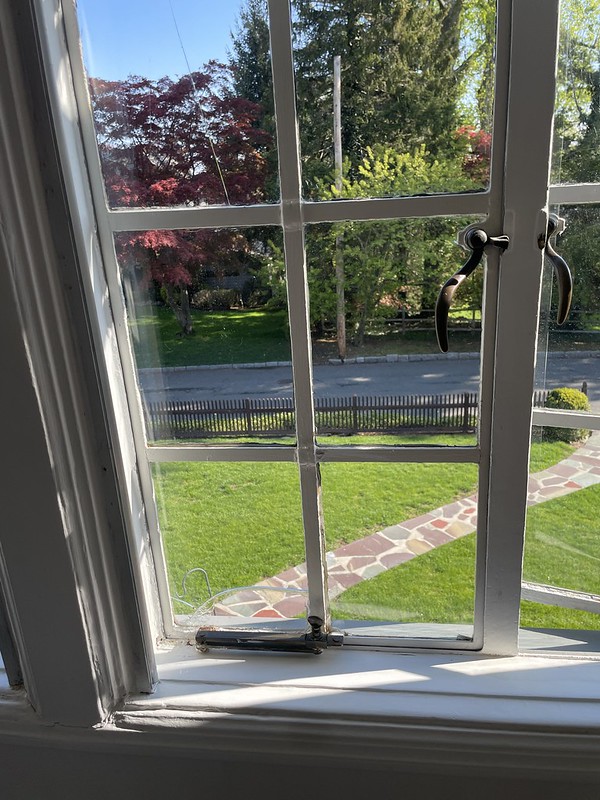Posts: 3,205
Threads: 0
Joined: Jul 2005
I'm not sure what's going on here. These are original, 100 year old windows, with individual panes in a metal framework. I've owned the house for about 1.5 years. There was a cracked pane when we bought the house, but this pane cracked a year ago. Initially, it was just a fine crack, going from the bottom left across the pane. But a couple of months ago, the bottom left started to . . . I don't know what it's doing. It's as if it's shattering, but very, very slowly. There are thin, little "shavings" of glass that cleaved off onto the sill -- like mica delaminating.
At first I thought it was the cold weather, but it's slowly getting worse now that the weather is getting warmer. My current thought is that the change in weather is causing the metal of the frames to expand and contract, and that's putting stress on the pane. I'm guessing that the pane is supposed to be floating in the frame, but it's bound up by the paint? The window opens and closes without problem, so I don't think that's putting any stress on it.
Thoughts?
Posts: 12,879
Threads: 0
Joined: Jan 2010
Location: Lewiston, NY
Divided lites usually are bedded in window glazing compound (putty) and when that dries for a couple of weeks, it's painted so that the paint seals onto the glass. It's done that way to protect the putty and give you a waterproof seal.
My guess as to why it cracked is because the sash twisted or bowed from something that got in the way when it was closed, or maybe there is some metal in between the sash and frame that rusted and bowed the sash. I'd inspect it for anything like that. And then I'd replace the pane. It's not hard to do and if you plan to keep those windows it's a skill you'll need. It's really simple with the sash out, but not all that hard with it in place if it's not too high off the ground.
Now that I think about it, maybe some water got down between the glass and sash and caused some rusting that pressed on the pane and that caused the crack. The splintered area suggests that might be the case. You'll know when you remove the glass. If there is rust in there, you'll want to remove it, then prime and paint it before installing the new glass.
John
Posts: 1,289
Threads: 0
Joined: Sep 2012
Location: Mobile, Alabama
This is just a guess. Hard to tell without taking the glass out. All of the glass panes should be smaller than the metal frame and held in place by the glazing (putty). If it fits snuggly, seasonal expansion and contraction of the metal frame could put enough pressure on the glass to cause the cracking you show. And, it might happen slowly as you suggest.
Posts: 1,936
Threads: 0
Joined: Feb 2008
When you take the glas and putty out look for curved wire springs. They're supposed to hold the glass in place, similar to glazing points. If you can salvage a few, use them as templates to make more with insulation supports.
Sign at N.E. Vocational School Cabinetmaking Shop 1976, "Free knowledge given daily... Bring your own container"
Posts: 64,652
Threads: 3
Joined: Feb 2007
Location: Merryland
Any visible movement around the window frames? Cracking in the plaster/drywall?
How old are those things?
Posts: 1,612
Threads: 0
Joined: Oct 2008
(04-26-2023, 10:10 AM)Snipe Hunter Wrote: Any visible movement around the window frames? Cracking in the plaster/drywall?
How old are those things?
From the OP "These are original, 100 year old windows, with individual panes in a metal framework."
Posts: 64,652
Threads: 3
Joined: Feb 2007
Location: Merryland
(04-26-2023, 11:50 AM)DieselDennis Wrote: From the OP "These are original, 100 year old windows, with individual panes in a metal framework."
Right, but is there any signs of movement in the wall around the frame?
Posts: 3,205
Threads: 0
Joined: Jul 2005
I don’t think so. But of course my big fear is that I’ve got a foundation/settling issue and it’s causing the wall to flex. But if that was the case, I figured I’d see more broken panes.
Posts: 64,652
Threads: 3
Joined: Feb 2007
Location: Merryland
(04-29-2023, 07:18 PM)David Stone Wrote: I don’t think so. But of course my big fear is that I’ve got a foundation/settling issue and it’s causing the wall to flex. But if that was the case, I figured I’d see more broken panes.
I've seen this in older houses. Most of the houses i inspect were built in the early 1900s. The foundation and walls don't have to move much to put pressure on the windows to make a pane crack. That's a lot of pressure and if the wall has a twist in it it adds a whole new dynamic.
I see a lot of stuck windows and can usually chock it up to 100 years of sloppy painting. But sometimes I can clearly see that paint isn't bridging between the frame/sill and the pane. I started carrying a small carpenters square and low and behold window frames can be 1/2" out of square and there's a noticeable difference in the gap around the sash. 100 years of settlement can do this. Some houses move a lot more in a much shorter time. It just depends on the condition of the soil under the foundation and the construction of the foundation. Foundations should be set on undisturbed soil but only the builder knows. Some soils, especially soil with a high water table just don't make good bases for foundations.
Usually houses/foundations pretty much stop settling in about 10 years but sometimes not. I'd do some research with a nice long level and square and check all around the house. Check the door and window frames and walls for plumb. Sometimes only one corner is moving and that can usually be seen by foundation cracks in that one corner. Sometimes there's cracks in various places. Sometimes walls bow. Especially in old balloon framed houses. That can be fixed. So can sinking foundations by slab and pier jacking.
If you're convinced the house has stopped moving, you can take out the windows, square the rough openings and reinstall the windows.
When I saw the picture and the corner cracked, my first thought is that your wall is moving. Every time I see it, it's in a corner pane.
Posts: 3,205
Threads: 0
Joined: Jul 2005
If my wall is moving, do I need to do something? Get a foundation person?
|












